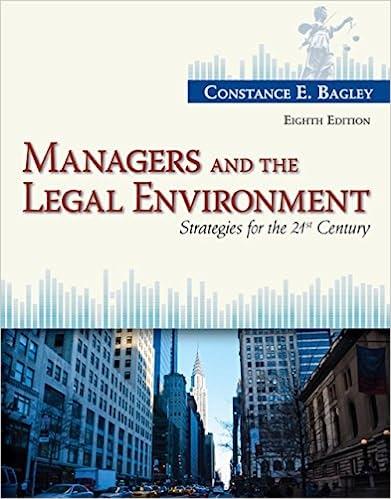In 2001, the city of Ontario, California, issued pagers capable of sending and receiving text messages to
Question:
In 2001, the city of Ontario, California, issued pagers capable of sending and receiving text messages to SWAT team members, including Jeff Quon, so they could better respond to emergencies. Arch Wireless provided wireless service for the pagers under a contract allotting each pager 25,000 characters sent or received each month.
Before acquiring the pagers, the city announced a "Computer Usage, Internet and E-Mail Policy" applicable to all employees. The policy specified that the city "reserves the right to monitor and log all network activity including e-mail and Internet use, with or without notice. Users should have no expectation of privacy or confidentiality when using these resources." Quon signed a statement acknowledging that he had read and understood the policy.
On its face, the policy did not apply to text messaging.
An e-mail sent on a city computer was transmitted through the city's own data servers, but a text message sent on one of the city's pagers was transmitted using wireless radio frequencies from an individual pager to a receiving station owned by Arch Wireless. Arch Wireless retained copies of the text messages on its computer servers. Although the policy did not explicitly cover text messages, the city held a meeting on April 18, 2002, at which officials made it clear that text messages sent on the pagers would be considered e-mail messages and would fall under the city's policy as public information eligible for auditing. Quon attended the meeting and also, along with other personnel, received a memo summarizing comments from the meeting.
By the second billing cycle, Quon had exceeded his monthly character allotment. Steven Duke, the officer in charge of the account, told Quon about the overage and reminded him that messages sent on the pagers could be audited. After Duke suggested that Quon reimburse the city for the overage fee rather than have Duke audit the messages, Quon wrote a check for the overage. Duke offered the same arrangement to other employees who incurred overage fees.
After Quon and others continued to exceed their character limits for several months, the department chief decided to determine whether the existing character limit was too low-that is, whether officers had to pay fees to send work-related messages. A review of transcripts obtained from Arch Wireless revealed that many of the messages to and from Quon's pager were not work related and some were sexually explicit. The internal affairs division concluded that Quon had violated the department's rules by pursuing personal matters while on duty, and he was disciplined.
Quon filed suit, alleging that the city had violated his Fourth Amendment rights against unreasonable search and seizure because he had a reasonable expectation of privacy in the content of his text messages. Would a court agree with this allegation? Why or why not?
Step by Step Answer:

Managers And The Legal Environment Strategies For The 21st Century
ISBN: 9781285860374
8th Edition
Authors: Constance E. Bagley





